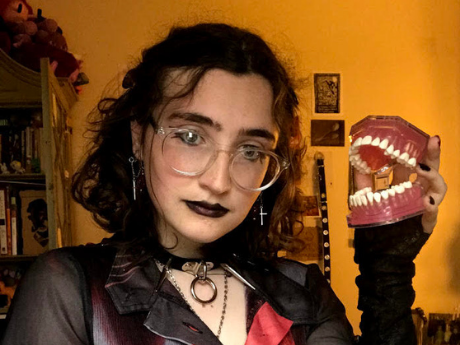Award Winners
Student Poetry Award | 2022
Bella Koschalk

Found a Mother
for Linda
And I am only
seventeen but you say you want me to treat
myself like a talisman.
And what is a talisman but a friend
of palm, tear, and whisper?
I take a trip to the outcrop,
bruise in the shape of you
mothering mossy malformations.
I take a trip to perfection,
to remember the cradle and the knife
that halved me.
Found-mother, you are a spearhead
of pearl, you are
the spine I couldn’t reach.
I take a trip to what you’ve taught me:
moss on quartz, an unafraid fawn, a woman
of a tree remembering medicine
into my mouth.
And I am only seventeen
so I see myself as a sword
without a master and I see myself
as the moment before
miscarriage.
But you took me on a trip
and you taught me to sew.
You made a bouquet of the sky and let me
drink it. You carved a spine
and shot it through me.
I found a mother at the top
of a doe’s arched back,
I found a mother and you
gave me the night as my sister
and the blood moon as my plea.
And someday, I will learn
me as a friend,
a talisman you taught to me.
Shira Erlichman on Bella Koschalk
From the onset, at its title, this poem shakes our universe. What does it mean to find a mother? The poem begins breathlessly mid-sentence, “And I am only / seventeen but—” as if the conversation is lifelong, and we readers have only now wandered in. Loss haunts the poem’s edges as the speaker eludes to “the cradle and the knife / that halved me,” seeing themself as “a sword / without a master” and “the moment before / miscarriage.” The ode that follows, dazzled with litany, is a praise song to the “Found-mother” who “took me on a trip and taught me to sew…” and “gave me the night as my sister.” Through syntactically imaginative leaps, the poem journeys us through longing toward incredible gratitude for a presence who protects the speaker’s self-esteem and future.
A good poet can use language to make us feel. A great poet strips language down, like a sycamore shedding stripes of bark, so that our most primordial yearnings are laid bare. In this concept-exploding poem the primordial yearning is for—in all its symbol and power—mothering. By subtly unraveling the notion of where a mother may reside, the poet uplifts this mysterious “found-mother” and their web of lessons. Like all true love poems, acceptance makes the speaker capable of revisioning loss and attaining the unimaginable: “You carved a spine and shot it through me.” By the poem’s end, I found myself delirious with gratitude for “moss on quartz, an unafraid fawn, / a woman / of a tree remembering medicine / into my mouth,” for all the mothers in my own life.
All Winners
2025
2025
2024
2023
2021
2020
2019
2018
2017
2016
2015
2014
2013
2012
2011
2010
2009
2008
2007
2006
2005
2004
2003
2002
2001
